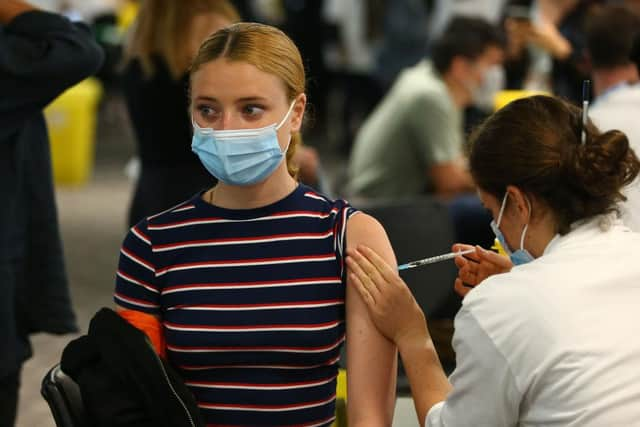Covid vaccine: gynaecologists warn 4,000 reports of change in periods after jab could be ‘a coincidence’
This article contains affiliate links. We may earn a small commission on items purchased through this article, but that does not affect our editorial judgement.
and live on Freeview channel 276
Leading gynaecologists have said that changes to usual period patterns after receiving a Covid-19 vaccine could have occurred “by chance”.
The comments from experts at the Royal College of Obstetricians and Gynaegologists (RCOG) come after recent data showed that there had been almost 4,000 reports of changes to usual menstruation.
Advertisement
Hide AdAdvertisement
Hide AdWe want to hear from you: let us know what you think about this story and be part of the debate in our comments section below


At a glance: 5 key points
- The Sunday Times reported that, as of 17 May, almost 4,000 women had reported menstrual side effects after receiving a Covid vaccine to the Medicines and Healthcare products Regulatory Agency (MHRA).
- These reports came from 2,734 who had the Oxford/AstraZeneca vaccine, 1,158 from the Pfizer vaccine and 66 as a result of the Moderna vaccine.
- Most of these reported side effects said that they had experienced heavier periods than usual.
Advertisement
Hide AdAdvertisement
Hide Ad- Experts from RCOG have said that the timing of these side effects and receiving of a Covid vaccine could just be “by chance”.
- The RGOC said that it would support collecting more data in order to do some deeper research.
What’s been said
Dr Pat O’Brien, Vice President for Membership at RCOG, said: “Many women will experience a temporary change in their periods from time to time during their lives.
“And right now, many women in their 20s and 30s are having the Covid vaccine.
Advertisement
Hide AdAdvertisement
Hide Ad“So it seems inevitable that in some women these two events will coincide by chance.
“If, however, these changes persist, or you have any new vaginal bleeding after the menopause, you should see your doctor.
“We also want to stress that these perceived changes in menstrual cycle after having the Covid-19 vaccine should not be confused with an impact on fertility and the ability to have children. There is no evidence to suggest that Covid-19 vaccines will affect fertility.”
Dr Sue Ward, Vice President for Education at RCOG, added: “We’re aware some women have been reporting a change to their period cycle or symptoms during the pandemic.
Advertisement
Hide AdAdvertisement
Hide Ad“The degree to which changing hormone levels will affect someone is often informed by her psychological well-being at that time.
“We know that life events can make PMS symptoms feel worse and something as all-consuming and life-changing as a global pandemic could result in women experiencing their periods differently.
“Anecdotally some women seem to be reporting heavier periods after receiving the Covid-19 vaccine and we would support more data collection in this area to understand why this might be the case.
“If you do notice any bleeding that is unusual for you, then we would recommend you contact your doctor.”
Advertisement
Hide AdAdvertisement
Hide AdDr June Raine, chief executive of the UK’s medicines regulator, the Medicines and Healthcare products Regulatory Agency (MHRA), said: “Alongside the independent experts of the Commission on Human Medicines and members of its Medicines for Women’s Health Expert Advisory Group, we have reviewed reports of menstrual disorders and unexpected vaginal bleeding, suspected as adverse reactions to vaccination.
“The current evidence does not suggest an increased risk, following vaccination, with the UK’s three Covid-19 vaccines.
“The number of reports is low in relation to the number of women who have had the vaccine to date and the background rate of menstrual disorders generally.
“We continue to closely monitor these reports for potential signals.”
Background
Advertisement
Hide AdAdvertisement
Hide AdIn the UK, there are currently three approved Covid-19 vaccines in rotation - Pfizer, Oxford/AstraZeneca and Moderna.
According to the Government website, nearly 75,000,000 vaccinations have been issued across the country. Around 43,130,000 have received their first dose, and almost 31,500,000 have received both doses.
A national immunisation campaign has been underway in the UK since early December of 2020, with the Government stating that vaccination “is the single most effective way to reduce deaths and severe illness from Covid-19”.
All vaccines and medicines can come with side effects, and the Covid-19 vaccines are no exception.
Some common side effects include fatigue, flu-like symptoms and a sore arm.
Comment Guidelines
National World encourages reader discussion on our stories. User feedback, insights and back-and-forth exchanges add a rich layer of context to reporting. Please review our Community Guidelines before commenting.
